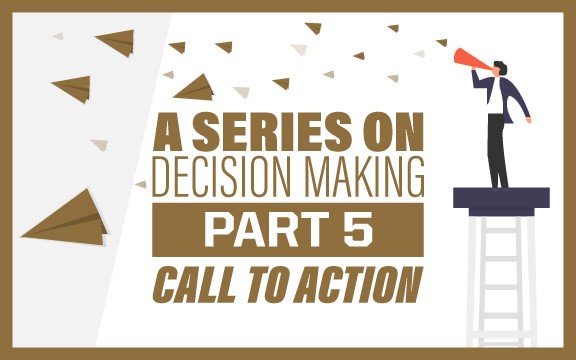Author: Dr. Pete Hammett, Visiting Professor

In this final installment of our series on decision making, we’ll reflect on practical suggestions for improving our effectiveness in decision making. If you’d like to catch up on previous parts of this series, you can read more here:
- A Series on Decision Making Part 1: Effective Decision Making vs. Captain Hindsight
- A Series on Decision Making Part 2: Views on Decision Making
- A Series on Decision Making Part 3: How Senior Execs Approach Decision Making: A Look at Personality Data From the C-Suite
- A Series on Decision Making Part 4: Observations on Decision Making
Recall in the beginning of this series, I suggested the myth in decision making is that a problem, crisis or opportunity can in fact be resolved with a well-timed decision when, in truth, problems are rarely solved and instead merely contained. As leaders attempt to navigate the endless streams of choices that come their way, decisions serve as temporary anchors that provide a momentary respite to catch our breath, gather our bearings and ready ourselves to navigate the next wave of decisions. To aid in this navigation, we would do well to consider three helpful anchors: operating at the edge of chaos, learning to ask questions and listen to the answers, and deflating our egos.
Operating at the edge of chaos
While much has been made of the importance of aligning structure and strategy, it is within the context of decision making that we can discover effective approaches for enabling creativity, resolving conflict and driving toward more effective and timely decisions. Key to establishing a more effective decision making process is fostering an environment that encourages alternative, if not radical, solutions to address complex problems while allowing freedom to conservatively discover both good and not-so-good ideas. It’s been said that many of us operate at the edge of chaos — a place somewhere between the stasis of ‘business as usual’ and the hectic pace of ‘what have you done for me lately?’.
At the time of this writing, the world is in the grip of the COVID-19 pandemic. With the challenges we are all facing, I’ve been asking myself and other business leaders the following question:
“What would we have done if in October of 2019 (before Coronavirus entered our vocabulary) someone in our organization offered an impassioned and well-reasoned argument for developing work-at-home plans for the majority of our workforce because of a widespread infectious disease?”
Reflecting on this question should give us pause to be ever mindful of the enablers and impediments to effective decision making:
| Enablers of Effective Decision Making | Impediments to Effective Decision Making |
|
|
Asking questions and listening to answers
A parable is told of three students who were sent by their teacher to travel the countryside and report back what they observed. After observing villagers coming and going in the local marketplace, each student was asked to share what insights they had learned. Two of the students commented that they’d come to see life as “ultimately the same from place to place”, and that “life is all about coming and going in search of the basics of life — no more and no less”. However, the third student was more puzzled than insightful, commenting,
“My mind is full of questions. I wonder where the villagers came from and what they are thinking and feeling. Why did they come to a particular village, who did they leave behind, who came with them and why? End in end, I am more filled with questions and unsure of what I have learned.”
Upon hearing the third student, the teacher smiled and said, “You have learned the most of all — the value of asking questions and listening to what people say.” We can see this parable play out in real life through observations made by Charan, Drotter and Noel in their book, “The Leadership Pipeline” (123-4):
“The best senior executives come to value asking questions and listening to a broad spectrum of people. This is almost counterintuitive value, given the power that comes with the executive position and the ego that’s required to obtain it.”
Letting go of your ego
Drawing on insights from “The Leadership Pipeline”, we find that one of the most important actions we can take to improve our decision making is letting go of our ego.
“The dictatorial, ego-driven executive tends not to ask many questions or listen to the answers. He values his own opinion above all others, and as a result, tunes out ideas and perspectives that clash with his own. While most new executives don’t fit the dictatorial prototype, many do not fully value listening to multiple perspectives. Too often, a new executive relies on one trusted advisor rather than soliciting a broad range of opinions and ideas,” (124).
A critical outcome from Collins’ “Good to Great” research has been identifying humility as an essential characteristic of those leading great companies. The challenge for senior executives to let go of their egos is further complicated by the continuous affirmation they receive to “keep doing what they’ve done”. Collins highlights this when he writes:
“…boards of directors frequently operate under the false belief that a larger-than-life, egocentric leader is required to make a company great. You can quickly see why Level 5 (personal humility + professional will) leaders rarely appear at the top of our institutions. We keep putting people in positions of power who lack the seed to become a Level 5 leader, and that is one major reason why there are so few companies that make a sustained and verifiable shift from good to great,” (145).
The question we must ask is how we find, develop and nurture leaders who are committed to achieving results and, at the same time, are willing to “subjugate their own needs to the greater ambition of something larger and more lasting than themselves,” (Collins 145).
Consider the following example offered by Henry and Richard Blackaby:
“Napoleon Bonaparte was constantly involved in warfare as he led the French Empire in its attempt to conquer Europe. In defeat, Napoleon surmised, ‘If I had succeeded, I should have been the greatest man known to history.’ There is no doubt that Napoleon made a name for himself in history, but it’s questionable whether his soldiers would have willingly sacrificed their lives on the battlefields of Europe had they known the primary cause was to secure their emperor’s fame. Today, many are called upon to make sacrifices and to give their best efforts on behalf of their organizations, but they do so with nagging doubts that their personal sacrifices are for no more noble purpose than furthering their leader’s career.”
If it’s difficult for leaders to let go of their personal ambitions for the good of a greater cause, how on earth can they let go of egos when they are confronted with differing opinions from their peers who are most likely vying for that higher rung on the corporate ladder?
I don’t believe there is an easy answers to the question of how to develop humble leaders, and I don’t believe that people are either born with the ability to be humble or they are not. However, I do believe that we can be inspired to lead humbly. Perhaps this begins with a few basic questions: Who do I want to lead? What lasting contribution do I want to make? Do I want to be remembered for the revenue I produced or the impact I made?
PERSONAL REFLECTION: The gift of a supportive spouse
One of the most important sources of honest, helpful insight I have found over the years has come from my wife. She is uniquely adept at keeping me balanced and not letting any over-inflated title or job assignment go to my head while simultaneously being able to lift my heart when things are going south in a big way. If you can forgive the gender-biased analogy, let me share a great story that helps make this point:
A very successful executive and his wife decided to attend the wife’s high school reunion. Driving into town, they stopped at a local gas station. The service manager politely attended to the executive’s car and quickly recognized the wife as his old high school sweetheart. After spending a little time catching up, they agreed to visit more at the reunion. Pulling away, the husband sheepishly commented to his wife, “Good thing you married me or you’d be married to a gas station manager.” Without missing a beat, the wife rebuffed, “My darling … had I married him, he’d be the successful executive and you’d be the gas station manager.”
:



